
Finding Your Perfect Smile: A Look at All Artificial Teeth Types
Uncover the best artificial teeth types for you. Learn about dentures, implants, bridges, and restore your confident smile.
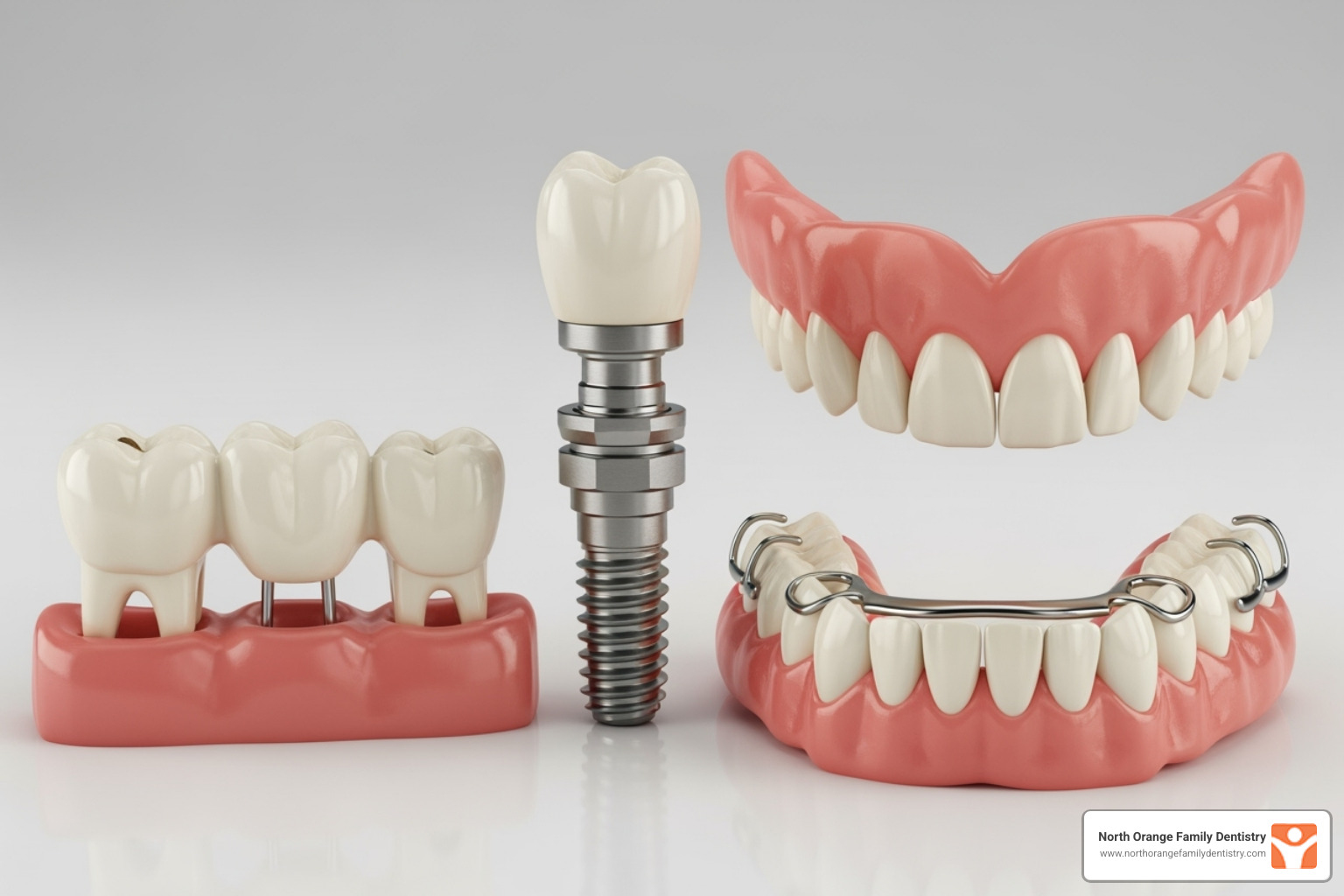

Why Replacing Missing Teeth Matters
Artificial teeth types offer hope when tooth loss affects your daily life. Whether from gum disease, accidents, or natural aging, missing teeth can impact everything from your smile to your ability to enjoy a meal with family.
The main artificial teeth types include:
- Complete dentures - Replace all teeth in upper or lower jaw
- Partial dentures - Fill gaps when some natural teeth remain
- Dental bridges - Fixed replacement anchored to adjacent teeth
- Dental implants - Individual titanium posts with crowns
- Implant-supported dentures - Dentures secured by implants for stability
Replacing missing teeth goes beyond appearance. Improved chewing function helps you enjoy favorite foods again. Your facial muscles get proper support, preventing the sunken look that comes with tooth loss. Most importantly, maintaining jawbone health prevents further deterioration.
The research shows that jawbone shrinkage following tooth loss can lead to facial collapse, characterized by sunken-in cheeks. This makes choosing the right replacement option crucial for your long-term oral health.
I'm Dr. Kyle Bogan, and throughout my career at North Orange Family Dentistry, I've helped countless families explore their options among the various artificial teeth types available today. My experience as a Fellow in both the International College of Dentists and the Academy of General Dentistry has shown me that the right choice depends on your unique needs, lifestyle, and goals for your smile.
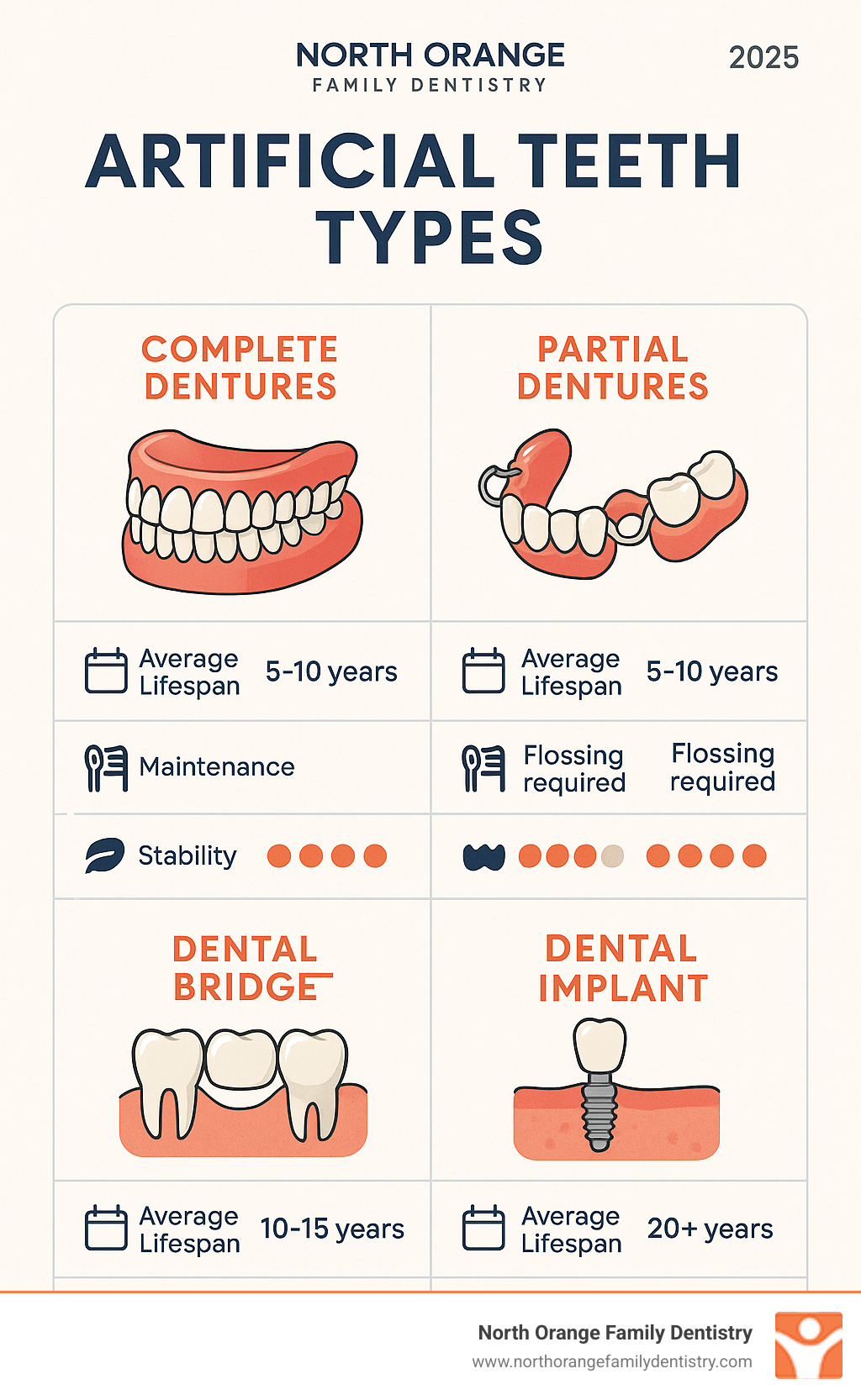
A Guide to the Main Artificial Teeth Types
When exploring artificial teeth types, you're looking at solutions that can truly transform your daily life. Each option serves different needs, from replacing a single tooth to restoring your entire smile. At North Orange Family Dentistry, I've seen how the right choice can bring back not just function, but genuine joy in eating and smiling again.
Let's walk through your options together, so you can understand what might work best for your unique situation.
Removable Dentures: The Traditional Choice
Removable dentures have been helping people smile confidently for generations. These prosthetic devices slip out of your mouth for cleaning and nighttime storage, making them familiar territory for many families.
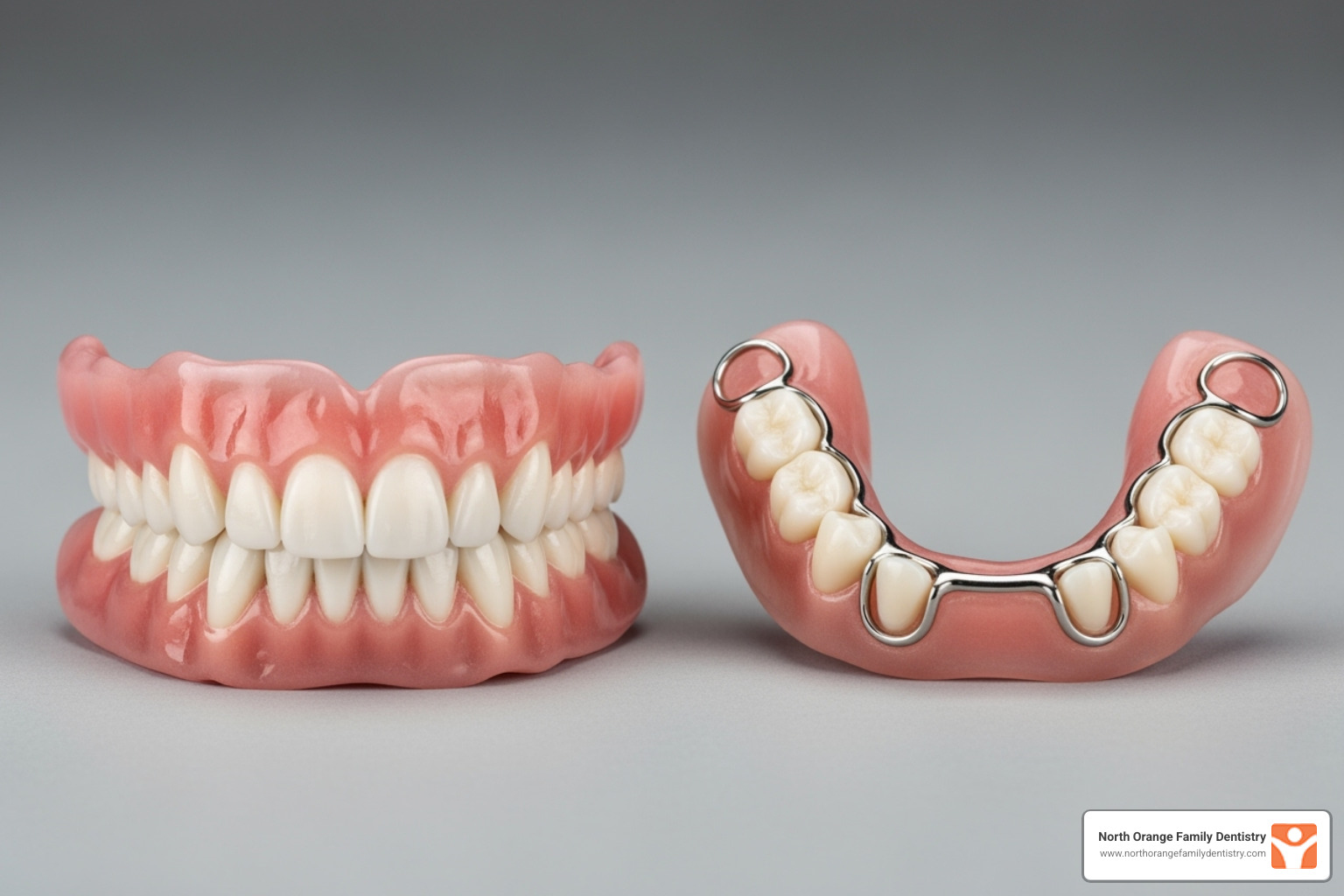
Full dentures come into play when you've lost all your teeth in either your upper or lower jaw. The upper denture covers your palate and stays put through suction, while the lower denture sits horseshoe-shaped on your gum ridge. It's amazing how well these work when properly fitted.
Partial dentures shine when you still have some healthy natural teeth remaining. Think of them as filling the gaps while keeping your remaining teeth from shifting into empty spaces. They use gentle clasps around your existing teeth for support and stability.
The materials have come a long way from the old days. Today's dentures use acrylic resin, a durable plastic that we can color-match to your natural gums. Flexible nylon partials offer an even more discreet option, blending seamlessly with your gum line without visible metal clasps.
The biggest benefit of removable dentures is that they're cost-effective and require no surgery. They restore your chewing function, improve speech, and provide that crucial facial support that prevents the sunken look that can occur with tooth loss.
However, let's be honest about the drawbacks. Traditional dentures can sometimes slip during conversations or meals, which understandably causes anxiety for many patients. There's definitely an adjustment period - usually several weeks to months - where you might experience increased saliva, temporary speaking difficulties, or some initial discomfort.
You can expect your dentures to last 7-10 years with proper care. Flexible partials typically serve you well for about five to eight years before needing replacement.
Maintenance becomes part of your daily routine. Daily cleaning with a soft brush and denture cleaner keeps them fresh, while soaking overnight in warm water gives your gums a much-needed break. Handle them carefully over a towel - dentures can break if dropped on hard surfaces.
For detailed care instructions, the Mayo Clinic offers excellent guidance on caring for removable dentures.
Fixed Solutions: Dental Implants and Bridges
When you're ready for something more permanent among artificial teeth types, fixed solutions offer remarkable stability. These stay in your mouth permanently, feeling much more like your natural teeth.
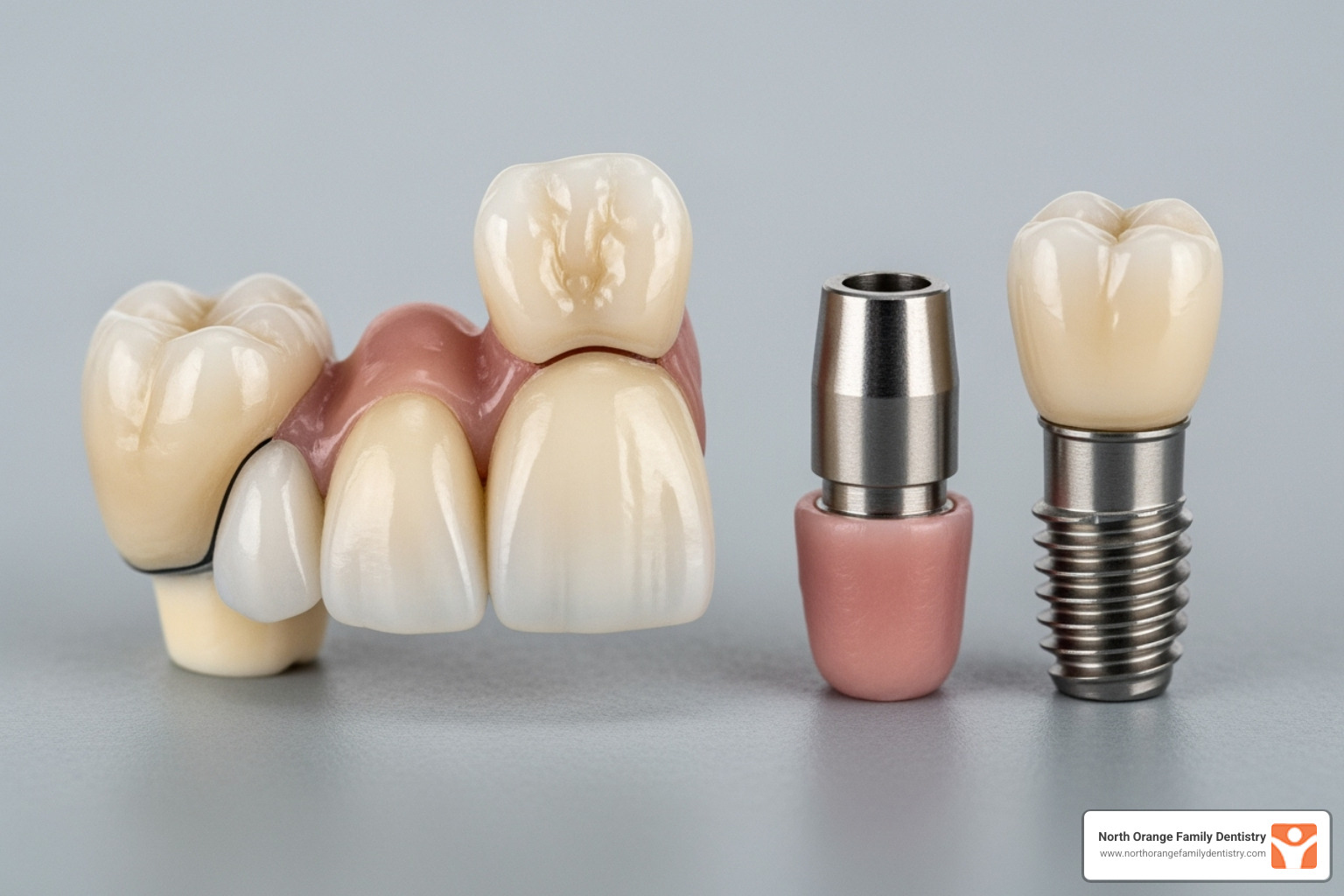
Dental bridges literally bridge the gap where teeth are missing. The artificial teeth (called pontics) attach to crowns placed on the healthy teeth on either side of the gap. These supporting teeth are called abutment teeth, and we reshape them slightly to accommodate the crowns that will hold your bridge securely.
Bridges work wonderfully for replacing one or several consecutive missing teeth. They're stable, restore your chewing ability, and help maintain proper alignment of your remaining teeth. The main consideration is that we need to modify those healthy adjacent teeth to support the bridge.
Dental implants represent the gold standard in tooth replacement. We place a titanium post directly into your jawbone, where it undergoes osseointegration - essentially fusing with your bone tissue over several months. This creates an incredibly strong foundation for your new tooth.
At North Orange Family Dentistry, we specialize in endosteal implants, the most common and successful type. These integrate directly into your jawbone, providing best stability. A single-tooth implant typically runs around $4500, making it a significant investment that often pays dividends for decades.
The benefits of implants are impressive. They offer exceptional longevity - with proper care, they can last a lifetime. Most importantly, they provide bone preservation by stimulating your jawbone just like natural tooth roots, preventing the facial changes that occur with bone loss.
Unlike bridges, implants don't affect your adjacent healthy teeth. You brush and floss them just like natural teeth, and they feel completely natural when chewing or speaking.
You can learn more about implants from the ADA's comprehensive guide or explore details about our dental implant services.
Implant-Supported Dentures: The Best of Both Worlds
Imagine combining the comprehensive coverage of dentures with the rock-solid stability of implants. That's exactly what implant-supported dentures deliver - a true hybrid solution that addresses the challenges of traditional dentures while remaining more accessible than individual implants for every tooth.
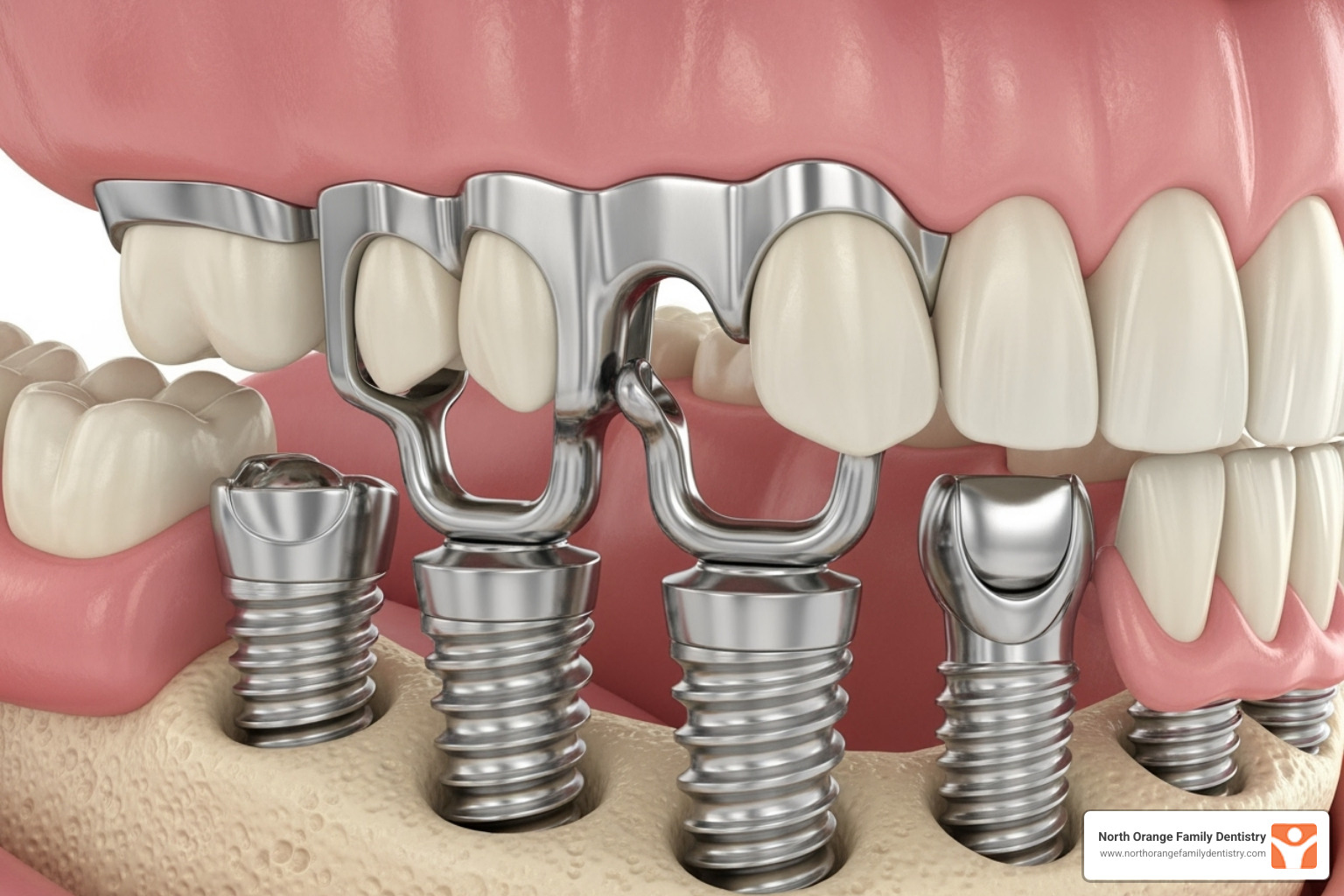
This hybrid solution works by anchoring your dentures to a few strategically placed implants in your jawbone. The result is increased stability that eliminates wobbling and means no adhesive needed - ever.
Implant-retained dentures offer a removable snap-on design. You can still take them out for cleaning, but they stay securely in place during daily activities. This option works particularly well for lower dentures, which traditionally struggle with stability.
Implant-supported dentures are permanently fixed in place - only we can remove them during your dental visits. These feel the most like natural teeth since they never move or shift.
The benefits are life-changing for many patients. You'll experience improved chewing power that lets you enjoy foods you might have avoided with traditional dentures. The comfort level increases dramatically without the constant movement and potential sore spots.
Your confidence soars when you know your teeth won't slip during important conversations or family dinners. Plus, the implants help preserve some jawbone density, maintaining better facial support over time.
Maintenance varies by type. Removable versions clean much like traditional dentures, while fixed versions require thorough daily cleaning including special flossing techniques underneath the denture.
Our digital denture technology makes these solutions even more precise and comfortable. You can find the advantages of digital dentures over traditional options and see how modern technology improves your experience.
Choosing Your Path to a Restored Smile
Finding the right artificial teeth types for your smile is one of the most important decisions you'll make for your oral health. It's a deeply personal choice that goes far beyond just replacing missing teeth – it's about restoring your confidence, your ability to enjoy meals with loved ones, and your overall quality of life.
At North Orange Family Dentistry, I've walked alongside countless patients through this decision-making process. What I've learned over the years is that there's no single "best" option among artificial teeth types. The perfect choice for you depends on your unique circumstances, and that's exactly what makes this journey so personal.
Key Factors for Selecting Artificial Teeth Types
When we sit down together in our Lewis Center office to discuss your options, we'll explore several important considerations that will guide us toward the right solution for your smile.
The number of missing teeth often shapes our initial direction. If you're dealing with just one or two missing teeth, we might focus on dental implants or a bridge. But if you've lost most or all of your teeth, we'll likely explore full dentures or implant-supported options that can restore your entire smile.
Your overall oral health plays a crucial role in determining which artificial teeth types will work best for you. The condition of your remaining natural teeth and gums helps us understand what's possible. For instance, if you're considering a bridge, we need healthy adjacent teeth to serve as anchors. If implants are on the table, healthy gums are essential for success.
Jawbone density becomes especially important when we're discussing implants or implant-supported dentures. These solutions rely on having sufficient bone structure to support the titanium posts. During your consultation, we'll evaluate your bone health and discuss any additional procedures that might be needed to ensure success.
Budget considerations are always part of our conversation, and I want you to know that we're committed to making quality dental care accessible. For families without dental insurance, our Dental Wellness Plan offers a practical solution. This plan provides discounted yearly dental care, helping you get the treatment you need without financial stress. We believe everyone deserves a healthy smile, and we'll work together to find an approach that fits your situation.
Your lifestyle preferences matter tremendously when choosing between removable and fixed options. Some patients love the idea of a permanent solution that feels just like their natural teeth – they want to eat, speak, and smile without ever thinking about their artificial teeth types. Others prefer the convenience of removable dentures that they can clean outside their mouth. There's no right or wrong choice here, just what feels right for your daily life.
The Process and Potential Challenges for all artificial teeth types
Starting your journey toward a restored smile is exciting, and I want you to feel prepared for what lies ahead. While the end result is incredibly rewarding, there's definitely an adjustment period that comes with any of the artificial teeth types we offer.
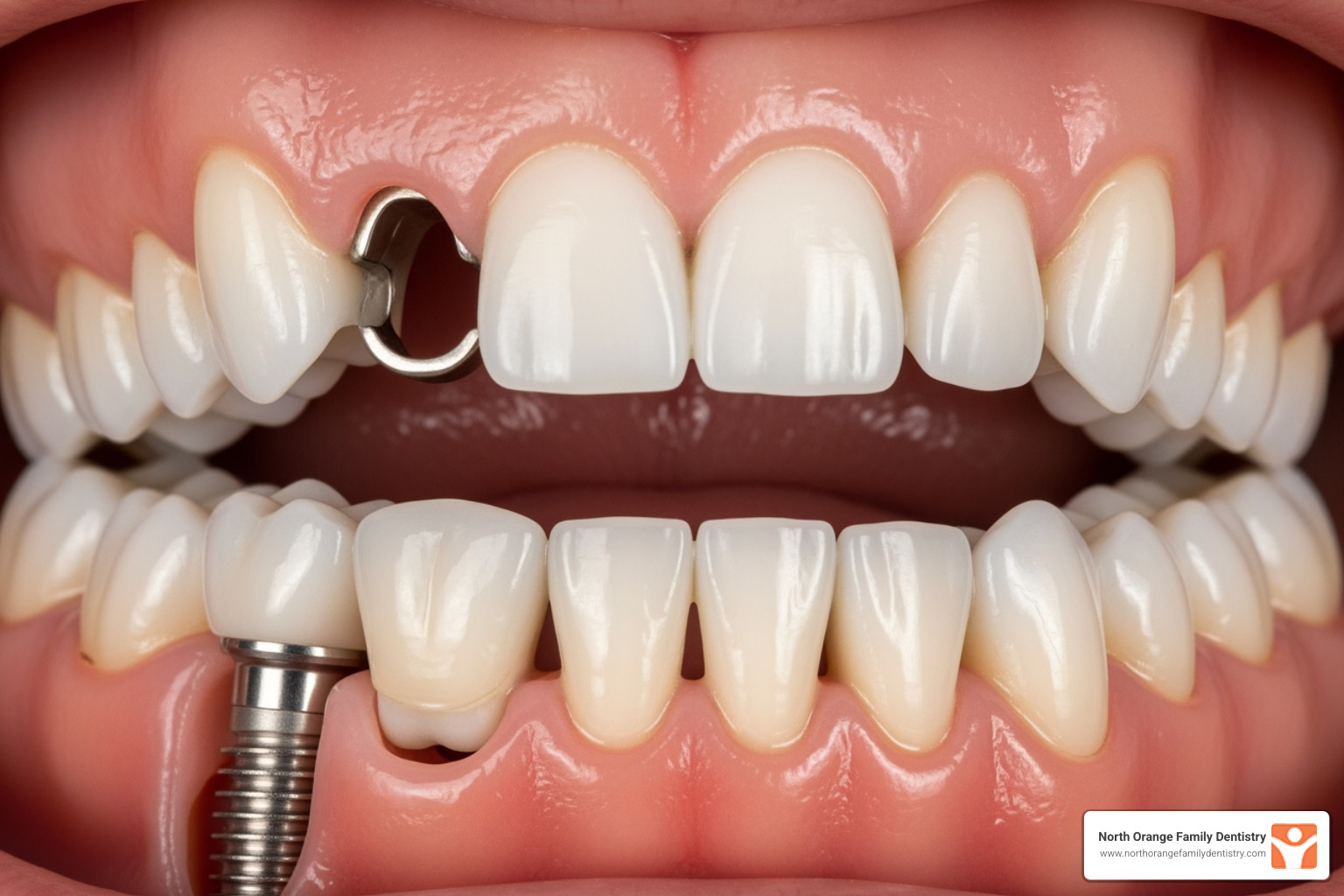
The Fitting Process
Every successful outcome begins with a thorough consultation at our office. We'll examine your mouth carefully, take digital X-rays, and discuss your medical history. But more importantly, this is where I listen to your concerns, answer your questions, and help you understand which options might work best for your specific situation.
Creating precise impressions is where our advanced technology really shines. Instead of those uncomfortable, messy impression materials you might remember from years past, we use state-of-the-art intraoral scanners. These create incredibly detailed 3D images of your teeth and gums, making the process more comfortable for you and ensuring a better fit for your new teeth.
The fabrication process happens in specialized dental labs using your precise digital impressions. Whether we're creating dentures, crowns, or implant components, every detail matters – from selecting the perfect shade to match your natural coloring to ensuring the bite feels just right.
When your new artificial teeth types are ready, we'll schedule your fitting appointment. This is where everything comes together, but it's rarely perfect on the first try. Most patients need several follow-up visits as we fine-tune the fit and make adjustments. This is completely normal and part of ensuring your long-term comfort and satisfaction.
Our Digital Denture Design process represents the latest advancement in creating comfortable, well-fitting artificial teeth from the very beginning.
Potential Challenges
I'll be honest with you – getting used to new artificial teeth types takes time. Most patients need anywhere from a few weeks to several months to feel completely comfortable, and that's perfectly normal.
Speaking clearly might feel challenging at first. Your tongue needs to learn where your new teeth are, and certain words might feel different. I often tell patients to practice reading aloud at home – it's like physical therapy for your mouth! Eating will also require some patience initially. Start with softer foods and gradually work your way back to your favorites as you gain confidence.
Sore spots can develop as your mouth adjusts to the new appliance. If you experience persistent discomfort, please don't suffer in silence – call us right away. A simple adjustment can often solve the problem quickly and get you back to feeling comfortable.
Some patients experience increased saliva production or even mild nausea during the first few days. These symptoms typically resolve as your mouth adapts to the changes. Think of it as your mouth's way of getting acquainted with its new residents!
Proper maintenance becomes part of your daily routine, but it's simpler than you might think. Most artificial teeth types require regular cleaning and occasional professional adjustments to keep them functioning optimally for years to come.
Your Next Steps with North Orange Family Dentistry
Here in Lewis Center, we're committed to providing the comprehensive family dental care that helps you achieve the smile you've been dreaming about. Our focus on delivering a five-star patient experience means you'll feel comfortable and confident from the moment you walk through our doors.
Under Dr. Kyle Bogan's expert care, you'll benefit from our commitment to advanced technology and personalized treatment plans. We use cutting-edge diagnostic tools and offer innovative treatments, including laser therapy for TMJ pain, canker sore healing, and periodontal disease treatment. When dental emergencies arise, we're here for you – most of the time, we can see patients the same day they call.
Choosing the right option for you means taking into account your unique needs, health status, and lifestyle preferences. Together, we'll select the artificial teeth types that not only restore your function and appearance but also fit seamlessly into your daily life.
Ready to explore how we can help you refind your confident smile? Learn about our latest innovations by visiting Modern Solutions: Find the World of Digital Dentures. We're excited to welcome you to our dental family and help you take this important step toward better oral health!
Why Replacing Missing Teeth Matters
Artificial teeth types offer hope when tooth loss affects your daily life. Whether from gum disease, accidents, or natural aging, missing teeth can impact everything from your smile to your ability to enjoy a meal with family.
The main artificial teeth types include:
- Complete dentures - Replace all teeth in upper or lower jaw
- Partial dentures - Fill gaps when some natural teeth remain
- Dental bridges - Fixed replacement anchored to adjacent teeth
- Dental implants - Individual titanium posts with crowns
- Implant-supported dentures - Dentures secured by implants for stability
Replacing missing teeth goes beyond appearance. Improved chewing function helps you enjoy favorite foods again. Your facial muscles get proper support, preventing the sunken look that comes with tooth loss. Most importantly, maintaining jawbone health prevents further deterioration.
The research shows that jawbone shrinkage following tooth loss can lead to facial collapse, characterized by sunken-in cheeks. This makes choosing the right replacement option crucial for your long-term oral health.
I'm Dr. Kyle Bogan, and throughout my career at North Orange Family Dentistry, I've helped countless families explore their options among the various artificial teeth types available today. My experience as a Fellow in both the International College of Dentists and the Academy of General Dentistry has shown me that the right choice depends on your unique needs, lifestyle, and goals for your smile.

A Guide to the Main Artificial Teeth Types
When exploring artificial teeth types, you're looking at solutions that can truly transform your daily life. Each option serves different needs, from replacing a single tooth to restoring your entire smile. At North Orange Family Dentistry, I've seen how the right choice can bring back not just function, but genuine joy in eating and smiling again.
Let's walk through your options together, so you can understand what might work best for your unique situation.
Removable Dentures: The Traditional Choice
Removable dentures have been helping people smile confidently for generations. These prosthetic devices slip out of your mouth for cleaning and nighttime storage, making them familiar territory for many families.

Full dentures come into play when you've lost all your teeth in either your upper or lower jaw. The upper denture covers your palate and stays put through suction, while the lower denture sits horseshoe-shaped on your gum ridge. It's amazing how well these work when properly fitted.
Partial dentures shine when you still have some healthy natural teeth remaining. Think of them as filling the gaps while keeping your remaining teeth from shifting into empty spaces. They use gentle clasps around your existing teeth for support and stability.
The materials have come a long way from the old days. Today's dentures use acrylic resin, a durable plastic that we can color-match to your natural gums. Flexible nylon partials offer an even more discreet option, blending seamlessly with your gum line without visible metal clasps.
The biggest benefit of removable dentures is that they're cost-effective and require no surgery. They restore your chewing function, improve speech, and provide that crucial facial support that prevents the sunken look that can occur with tooth loss.
However, let's be honest about the drawbacks. Traditional dentures can sometimes slip during conversations or meals, which understandably causes anxiety for many patients. There's definitely an adjustment period - usually several weeks to months - where you might experience increased saliva, temporary speaking difficulties, or some initial discomfort.
You can expect your dentures to last 7-10 years with proper care. Flexible partials typically serve you well for about five to eight years before needing replacement.
Maintenance becomes part of your daily routine. Daily cleaning with a soft brush and denture cleaner keeps them fresh, while soaking overnight in warm water gives your gums a much-needed break. Handle them carefully over a towel - dentures can break if dropped on hard surfaces.
For detailed care instructions, the Mayo Clinic offers excellent guidance on caring for removable dentures.
Fixed Solutions: Dental Implants and Bridges
When you're ready for something more permanent among artificial teeth types, fixed solutions offer remarkable stability. These stay in your mouth permanently, feeling much more like your natural teeth.

Dental bridges literally bridge the gap where teeth are missing. The artificial teeth (called pontics) attach to crowns placed on the healthy teeth on either side of the gap. These supporting teeth are called abutment teeth, and we reshape them slightly to accommodate the crowns that will hold your bridge securely.
Bridges work wonderfully for replacing one or several consecutive missing teeth. They're stable, restore your chewing ability, and help maintain proper alignment of your remaining teeth. The main consideration is that we need to modify those healthy adjacent teeth to support the bridge.
Dental implants represent the gold standard in tooth replacement. We place a titanium post directly into your jawbone, where it undergoes osseointegration - essentially fusing with your bone tissue over several months. This creates an incredibly strong foundation for your new tooth.
At North Orange Family Dentistry, we specialize in endosteal implants, the most common and successful type. These integrate directly into your jawbone, providing best stability. A single-tooth implant typically runs around $4500, making it a significant investment that often pays dividends for decades.
The benefits of implants are impressive. They offer exceptional longevity - with proper care, they can last a lifetime. Most importantly, they provide bone preservation by stimulating your jawbone just like natural tooth roots, preventing the facial changes that occur with bone loss.
Unlike bridges, implants don't affect your adjacent healthy teeth. You brush and floss them just like natural teeth, and they feel completely natural when chewing or speaking.
You can learn more about implants from the ADA's comprehensive guide or explore details about our dental implant services.
Implant-Supported Dentures: The Best of Both Worlds
Imagine combining the comprehensive coverage of dentures with the rock-solid stability of implants. That's exactly what implant-supported dentures deliver - a true hybrid solution that addresses the challenges of traditional dentures while remaining more accessible than individual implants for every tooth.

This hybrid solution works by anchoring your dentures to a few strategically placed implants in your jawbone. The result is increased stability that eliminates wobbling and means no adhesive needed - ever.
Implant-retained dentures offer a removable snap-on design. You can still take them out for cleaning, but they stay securely in place during daily activities. This option works particularly well for lower dentures, which traditionally struggle with stability.
Implant-supported dentures are permanently fixed in place - only we can remove them during your dental visits. These feel the most like natural teeth since they never move or shift.
The benefits are life-changing for many patients. You'll experience improved chewing power that lets you enjoy foods you might have avoided with traditional dentures. The comfort level increases dramatically without the constant movement and potential sore spots.
Your confidence soars when you know your teeth won't slip during important conversations or family dinners. Plus, the implants help preserve some jawbone density, maintaining better facial support over time.
Maintenance varies by type. Removable versions clean much like traditional dentures, while fixed versions require thorough daily cleaning including special flossing techniques underneath the denture.
Our digital denture technology makes these solutions even more precise and comfortable. You can find the advantages of digital dentures over traditional options and see how modern technology improves your experience.
Choosing Your Path to a Restored Smile
Finding the right artificial teeth types for your smile is one of the most important decisions you'll make for your oral health. It's a deeply personal choice that goes far beyond just replacing missing teeth – it's about restoring your confidence, your ability to enjoy meals with loved ones, and your overall quality of life.
At North Orange Family Dentistry, I've walked alongside countless patients through this decision-making process. What I've learned over the years is that there's no single "best" option among artificial teeth types. The perfect choice for you depends on your unique circumstances, and that's exactly what makes this journey so personal.
Key Factors for Selecting Artificial Teeth Types
When we sit down together in our Lewis Center office to discuss your options, we'll explore several important considerations that will guide us toward the right solution for your smile.
The number of missing teeth often shapes our initial direction. If you're dealing with just one or two missing teeth, we might focus on dental implants or a bridge. But if you've lost most or all of your teeth, we'll likely explore full dentures or implant-supported options that can restore your entire smile.
Your overall oral health plays a crucial role in determining which artificial teeth types will work best for you. The condition of your remaining natural teeth and gums helps us understand what's possible. For instance, if you're considering a bridge, we need healthy adjacent teeth to serve as anchors. If implants are on the table, healthy gums are essential for success.
Jawbone density becomes especially important when we're discussing implants or implant-supported dentures. These solutions rely on having sufficient bone structure to support the titanium posts. During your consultation, we'll evaluate your bone health and discuss any additional procedures that might be needed to ensure success.
Budget considerations are always part of our conversation, and I want you to know that we're committed to making quality dental care accessible. For families without dental insurance, our Dental Wellness Plan offers a practical solution. This plan provides discounted yearly dental care, helping you get the treatment you need without financial stress. We believe everyone deserves a healthy smile, and we'll work together to find an approach that fits your situation.
Your lifestyle preferences matter tremendously when choosing between removable and fixed options. Some patients love the idea of a permanent solution that feels just like their natural teeth – they want to eat, speak, and smile without ever thinking about their artificial teeth types. Others prefer the convenience of removable dentures that they can clean outside their mouth. There's no right or wrong choice here, just what feels right for your daily life.
The Process and Potential Challenges for all artificial teeth types
Starting your journey toward a restored smile is exciting, and I want you to feel prepared for what lies ahead. While the end result is incredibly rewarding, there's definitely an adjustment period that comes with any of the artificial teeth types we offer.

The Fitting Process
Every successful outcome begins with a thorough consultation at our office. We'll examine your mouth carefully, take digital X-rays, and discuss your medical history. But more importantly, this is where I listen to your concerns, answer your questions, and help you understand which options might work best for your specific situation.
Creating precise impressions is where our advanced technology really shines. Instead of those uncomfortable, messy impression materials you might remember from years past, we use state-of-the-art intraoral scanners. These create incredibly detailed 3D images of your teeth and gums, making the process more comfortable for you and ensuring a better fit for your new teeth.
The fabrication process happens in specialized dental labs using your precise digital impressions. Whether we're creating dentures, crowns, or implant components, every detail matters – from selecting the perfect shade to match your natural coloring to ensuring the bite feels just right.
When your new artificial teeth types are ready, we'll schedule your fitting appointment. This is where everything comes together, but it's rarely perfect on the first try. Most patients need several follow-up visits as we fine-tune the fit and make adjustments. This is completely normal and part of ensuring your long-term comfort and satisfaction.
Our Digital Denture Design process represents the latest advancement in creating comfortable, well-fitting artificial teeth from the very beginning.
Potential Challenges
I'll be honest with you – getting used to new artificial teeth types takes time. Most patients need anywhere from a few weeks to several months to feel completely comfortable, and that's perfectly normal.
Speaking clearly might feel challenging at first. Your tongue needs to learn where your new teeth are, and certain words might feel different. I often tell patients to practice reading aloud at home – it's like physical therapy for your mouth! Eating will also require some patience initially. Start with softer foods and gradually work your way back to your favorites as you gain confidence.
Sore spots can develop as your mouth adjusts to the new appliance. If you experience persistent discomfort, please don't suffer in silence – call us right away. A simple adjustment can often solve the problem quickly and get you back to feeling comfortable.
Some patients experience increased saliva production or even mild nausea during the first few days. These symptoms typically resolve as your mouth adapts to the changes. Think of it as your mouth's way of getting acquainted with its new residents!
Proper maintenance becomes part of your daily routine, but it's simpler than you might think. Most artificial teeth types require regular cleaning and occasional professional adjustments to keep them functioning optimally for years to come.
Your Next Steps with North Orange Family Dentistry
Here in Lewis Center, we're committed to providing the comprehensive family dental care that helps you achieve the smile you've been dreaming about. Our focus on delivering a five-star patient experience means you'll feel comfortable and confident from the moment you walk through our doors.
Under Dr. Kyle Bogan's expert care, you'll benefit from our commitment to advanced technology and personalized treatment plans. We use cutting-edge diagnostic tools and offer innovative treatments, including laser therapy for TMJ pain, canker sore healing, and periodontal disease treatment. When dental emergencies arise, we're here for you – most of the time, we can see patients the same day they call.
Choosing the right option for you means taking into account your unique needs, health status, and lifestyle preferences. Together, we'll select the artificial teeth types that not only restore your function and appearance but also fit seamlessly into your daily life.
Ready to explore how we can help you refind your confident smile? Learn about our latest innovations by visiting Modern Solutions: Find the World of Digital Dentures. We're excited to welcome you to our dental family and help you take this important step toward better oral health!

Contact Us
Have any questions? Want to learn more?


